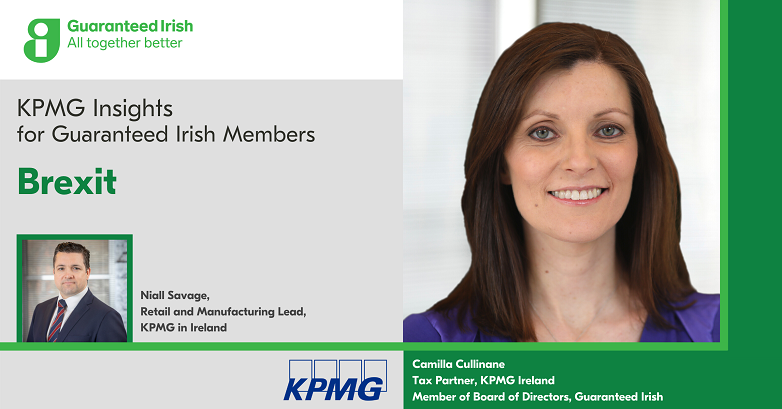Niall Savage Retail & Manufacturing Lead, KPMG Ireland and Camilla Cullinane Tax Partner, KPMG Ireland and Member of Board of Directors, Guaranteed Irish share expert insights into Brexit for their fellow Guaranteed Irish members with key considerations for retailers and manufacturers.
What is happening?
The UK has now (finally) left the EU’s Custom Union and Single Market from the start of the year. As widely predicted, there has been considerable disruption from day one for certain businesses, particularly for retailers.
Daily reports have emanated of “Brexit shocks” including:
- Empty shelves in Irish branches of UK retailers;
- Truck drivers being stuck at ports for days (with their goods spoiling);
- Suspension and/or price increases for virtual address services;
- The “pausing” of all deliveries from the UK to Ireland by DPD;
- Additional VAT and levies being charged (correctly and incorrectly) on online purchases;
- Re-routing of ferries directly to France to bypass the UK “Landbridge”
- Rotting UK fish stocks, crippled by export costs, and
- The unavailability of Percy Pig sweets.
Irish businesses already heavily impacted by the Covid pandemic, need to understand and mitigate the immediate risks arising from Brexit, but equally need to be aware of the potential opportunities presenting themselves.
The good news for many Irish manufacturers is that the UK customs have deferred much of their customs requirements on goods for 6 months, providing time to learn the new UK regime.
Why is the disruption happening?
Despite having over four years to prepare, Brexit has clearly blindsided several retailers and supporting manufacturers. In their defence, the final detailed agreement was only reached on Christmas Eve 2020 – so just over a week (the pandemic dominated Christmas holidays) to prepare for another “new normal”.
Anecdotally, this has resulted in decreased volumes in UK goods landing in Irish ports for three reasons:
- Intention – some businesses are playing a “wait and see” game holding shipments (and sacrificing sales) until there is greater clarity on the increased costs and taxes;
- Confusion – others have ploughed ahead but had difficulty in getting the paperwork correct, delaying the safe passage of their wares; and
- Preparation – stockpiling of goods pre-31 December in anticipation of Brexit has reduced the normal levels of January traffic.
These additional customs processes are permanent, additional requirements for trade between Britain and the EU. They are new, complex and time consuming. A customs declaration has 57 boxes to complete including commodity code, weight, origin and value. Time and experience should enable most businesses to understand the paperwork and get to grips with new Rules of Origin conditions.
It is these Rules of Origin conditions that underpin much of the unforeseen disruption. While the final Brexit Free Trade Agreement (FTA) eliminated all customs duties on goods between the UK and the EU, there were extensive conditions to determine whether goods can avail of this agreement. The classic example is cornflakes from Spain being shipped to the UK and repackaged before onward shipping to Ireland – under the new rules of origin they are subject to tariffs on the way into Ireland as they lose their EU status and don’t gain UK status as the level of work done on them in the UK isn’t sufficiently high. The new rules also affect UK retailers importing clothes, home furnishings etc. from China and re-exporting them to the EU which will now potentially incur additional customs charges.
UK retailers are therefore rapidly considering strategic options and may exit certain markets if supply chain solutions cannot be found – this provides potential competitive advantages to EU manufacturers and retailers.
Less effect on Irish exporters … for now
There has not been the same disruption noted for Irish exporters, yet. This is in part down to covid lockdowns affecting demand, an element of stockpiling pre-Christmas and normal seasonal demand.
There is another simpler reason, the UK has provided a six month deferral on post-Brexit customs declarations and collection of tariffs. Therefore Irish exporters will not be subject to the same “Brexit shocks” until 30 June 2021.
This gives Irish exporters and hauliers more time to prepare for new customs processes and the UK time to build the infrastructure. This is in direct contrast to the EU approach encountered by UK exporters.
What should businesses do now to mitigate disruption?
There is an immediate need to understand the effects of Brexit in the following three areas and seek advice as appropriate to minimise disruption and loss of revenue.
- Supply Chain and Country of Origin
The FTA permits unlimited movement of goods wholly produced in the UK and EU, it is therefore critical to understand where raw materials and components are produced. Understanding non-EU/UK components is critical and the effect this will have under new customs rules is essential.
- VAT and Customs rules
If you are trading with the UK (import or export) there are a significant number of factors to consider:
- Registration for an EORI number to allow shipments pass through customs
- Put in place a process for filing customs declarations (e.g. customs agent, in-house or freight company) and payment (if required)
- Assess whether there is any import VAT payable and separately put a process in place for this
- Check whether additional quality control checks are required for goods – sanitary, food etc.
To maximise opportunities, businesses need to understand or take advice on the various reliefs and deferrals such as customs warehousing and inward processing relief.
- People
Critically, the Common Travel Area will continue to operate and apply to Irish and UK nationals.
However, there are a number of immigration changes which may affect your existing workforce. These include:
- Other EU nationals living and working in the UK must make an immigration application;
- EU nationals entering the UK for work purposes, are likely to require a work visa;
- UK nationals living and working in EU countries other than Ireland may need to make an immmgration application depending on the circumstances of their travel or residence; and
- In Ireland, there will also be will be additional pre-clearance visa requirements for the non-EU partners / dependents of UK nationals working in Ireland.
www.home.kpmg/ie





